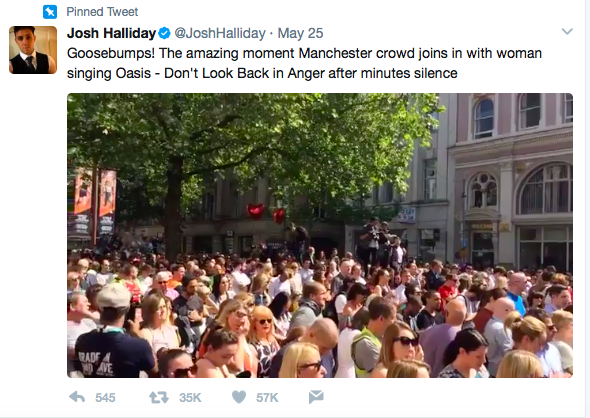Almost a week has passed since the attack that killed 22 innocent civilians at a pop concert in Manchester. Terrorist attacks are appalling, sickening and distressing, but there is something about this attack on such a young demographic that is particularly unthinkable.
It is not the first time that Manchester has been the victim of such an attack; the IRA bombed the city in 1996, causing considerable destruction and injury.
Thus, it came as no surprise that outrage followed the condolences expressed by Sinn Féin’s Northern leader, Michelle O’Neill. It wasn’t long before parallels between the two incidents were drawn.
As the devastating news began to unfold last Monday night, from this writers view it seemed that no compassionate reason – other than the opportunity to score political points – was being articulated.
Given that over 1500 people lost their lives in Northern Ireland as a result of the IRA campaign during the Troubles, victims are suitably aligned to empathise and exhibit solidarity with those left to suffer a similar fate in Manchester.
That said, in Northern Ireland, often fixation on our own dark past triggers a tailoring of comparisons to anything remotely similar. It seems that such instantaneous reactions inflict a real disservice on communities like Manchester where the horror is still raw.
Once again, a number of our politicians and commentators have failed to grasp how little credibility comes with drawing everything back to our own past.
Yet, those who used the horrific terrorist attack to score political points can ultimately learn from Manchurians, many of whom have refused to let the attack divide the culturally diverse metropolis.
One heartfelt example of this is a clip of gathered mourners singing the Gallagher brothers’ ‘Don’t look back in anger’ after a minute’s silence to remember victims took place in central Manchester.

See the original tweet (with video): https://twitter.com/JoshHalliday/status/867686062440796160
Similar reactions are not unknown to us here in Northern Ireland. After the death of his daughter in the Enniskillen bombing, peace campaigner Gordon Wilson had these remarkable words to say:
I have lost my daughter, and we shall miss her. But I bear no ill will. I bear no grudge. Dirty sort of talk is not going to bring her back.
In the face of so much sadness, we must recognise there is a difference between ‘just’ anger and simply abusing an extremely devasting incident as a means to politically grandstand.
We must air on the side of caution when people are seemingly compassionate and at the same time politically crass in one sentence, or, in many cases, one tweet.
